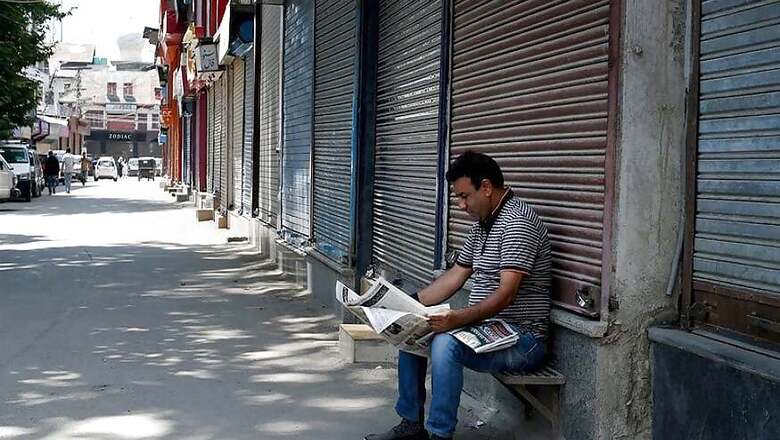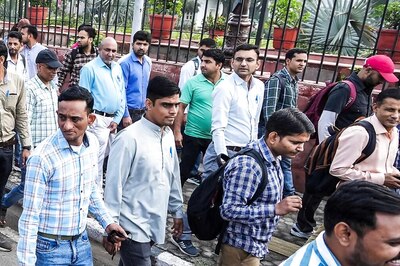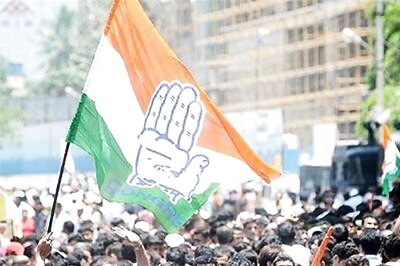
views
Srinagar: With the communication clampdown that followed the government's move to abrogate articles 370 and 35A of the Constitution, journalism in Kashmir was thrown back to an age sans telephone and internet services, which posed a major challenge to local journalists in discharging their duties.
Until then, a large number of people preferred to read or watch news online. Since August 5, when the decision to revoke Jammu and Kashmir's special status was announced, the media in the Valley went into an offline mode.
The suspension of phone and internet services proved to be a major impediment not only for the operation of business ventures, but also for the media. From reporting to printing to distribution, everything was hampered.
The worst affected were news portals and online versions of newspapers. Although landlines and post-paid mobile services have now been restored, news portals and online newspapers have not been updated for over two months as internet services still remain suspended.
Rising Kashmir shrunk to four pages
Our newspaper, 'Rising Kashmir', could bring out only four pages for the first two days after August 5 owing to the lockdown. Our journalists had to watch television and listen to radio news to collate information for their stories. Print journalism is considered the "big brother" in journalism and it is usually television and radio that follow news from the print media. But this time around, the wheels seemed to have turned the other way.
The newsroom had lost contact with reporters working in districts due to the communication blackout. They could not report developments taking place in their areas.
Even if they could somehow manage to gather news, it was not possible for them to send their stories to the Srinagar office. Only reporters living in Srinagar were able to file stories and this made bringing out the edition a herculean task for editors.
Not only news gathering, but attendance of staff also thinned due to restrictions. Normally, the office used to send cars to pick employees from their homes and drop them back at night.
But due to the suspension of mobile services, there was no way to coordinate and the cab facility had to be stopped. Public transport was off the roads. Hence, only those either living in the vicinity of the office or had their own vehicles could come to work.
The production of the newspaper also suffered. As the workers at the press are mostly from Uttar Pradesh, they left the city after the clampdown was imposed. Despite the management assuring them that they were safe here, non-local workers decided to go home. The management was forced to rely solely on local workers to print the newspapers and it was not an easy feat.
The reason for the departure of non-local workers and machine workers was not the scrapping of articles 370 and 35 (A) of the Constitution, but the clampdown that snapped their contact with their family members who were worried, like every other local unable to reach out to their family members living away from home.
Pen drive journalism
The revenue of the newspaper was badly hit as well. Newspapers nowadays receive advertisements from the Directorate of Information and the corporate sector through emails. The suspension of internet hindered their flow. 'Rising Kashmir' managed to get some of its ads through USB drives.
In a way, these USB drives became the lifeline of journalism in Kashmir during the clampdown. Whether it was advertisements or news material, the USB drives were the only option left with media during this period.
As far as reportage is concerned, journalists faced a lot of difficulty in commuting to different places due to the shutdown and restriction on movement. They found it difficult to reach out to officials and experts. Their job had turned risky as well since the slipping out of even minor information could land them in trouble.
The government set up a media facilitation centre at a hotel in Srinagar on August 16 where internet was provided on five computers. Later, another five such systems were added. It enabled journalists to file stories and download news material from the internet. At the centre, each journalist gets around 15 minutes to access the internet.
Like employees of other news outlets, a mediaperson from 'Rising Kashmir' goes to the centre everyday and downloads news material from the Press Trust of India (PTI) and other agencies that we subscribe to. These days, a bulk of the news that 'Rising Kashmir' publishes comes from PTI.
Communication through advertisements
The communication blackout affected common people in various ways. Since they were unable to talk to their kin on phone, it resulted in an increase in visits to relatives’ places.
Newspapers provided some relief in their own way. As even information, such as the death of a near one, was impossible to be passed on, most people started putting them out as obituaries in the dailies.
Locals also used newspaper advertisements to inform relatives and friends about the cancellations of marriage ceremonies or other such events. Schools and colleges also communicated with students and parents through ads.
Initially, the restrictions were stringent. As days passed, the curbs were gradually lifted and most parts of the Valley now are accessible.
However, without any internet facility, newspapers have remained the main source of information for people and a bridge between the public and government. The demand for newspapers is high in comparison to normal days.
E-governance vision jammed
People expect that the inconvenience caused to them in the aftermath of the scrapping of the special status of Kashmir will soon come to an end. The restoration of landlines and postpaid mobile services indicates that normalcy is not far away.
But the government’s decision to continue with the suspension of internet services seems to be the missing link here. The administration says internet is more likely to be used by militants for “malicious activities”.
Whatever the reason, it has also affected Prime Minister Narendra Modi’s e-governance vision for Kashmir. Due to the unavailability of internet, people of the Valley cannot use facilities like e-filing, online shopping and transactions.
One can only hope that the situation remains peaceful and the rest of services suspended since August 5 are restored soon. As for journalism in Kashmir, it has survived decades of trying and testing times and will survive this difficult period as well.
(The author is the son of the late Shujaat Bukhari, the founding editor of 'Rising Kashmir'. Views are personal.)



















Comments
0 comment